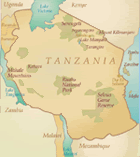Swahili School Drop Out

Yesterday I dropped out of Swahili classes – for the second time. It was an inauspicious end to my first year in Tanzania. There will be no graduation day for me.
What’s my excuse? I’ve got lots of them. I’m too busy. I cannot commit to one night a week. I’m too old to learn a new language. All my colleagues speak perfect English and so I never get to practice. The list goes on and on and on.
But it’s all bullshit. At my age I should just decide to do something and stay the course, right? Where’s my stick-to-it-ive-ness? Don’t I want to be an amateur anthropologist and get “closer” to the Tanzanian people through the language they speak?
How will I be able to justify having spent two or three years in Tanzania to my ex-Peace Corps friends if I don’t have some serious Swahili language under my belt?
Truthfully, I’ve always thought it a noble aspiration to speak more than one’s native tongue. Although I’ve dabbled at different times – and to different levels of success – with Hebrew, Arabic and Spanish, the only languages I can truly claim to speak are English and French.
(After 10 Arabic classes I had the audacity to add Arabic to my CV when I was 22. My friend, Pam, has still never let me live that one down.)
I actually don’t even remember learning French. I was young, I was surrounded by French people, I wanted to talk with them teen-to-teen, and I just learned it by osmosis. I’m not trying to negate the efforts of Mr. McIntyre or Mr. Wartenby, my high school French teachers. But really… I don’t remember studying, I don’t remember making an effort. I just went to France in my summers and it happened.
So you’d think that me being here in Tanzania it would be the same – that the Swahili would just seep in.
Well… it hasn’t. At least not in any significant way. And that’s a shame, because everything I know about Swahili makes it seem like an interesting language to learn.
Swahili is a combination of Arabic and Bantu – with a few words of other languages thrown in. My most recent Swahili teacher, a fabulous gay Australian who has lived in Tanzania for 20 years really made Swahili come alive for me. There are some cool things. Like how after 200 years of sailing up and down the Swahili coast, there are only about 10 words of Portuguese that made it into the Swahili language – including the words for playing cards, wine, and masturbating (I guess we know what those Portuguese sailors were doing). And Swahili has way fewer words than most languages. For example, think about how many ways you can say “laugh” in English (giggle, kafaw, etc.). In Swahili there is only one word.
My favorite thing is what they do with new words – particularly English words - coming into the language. They just add an “i”. So if you are at a restaurant and you want the bill you just ask for the billi. If you want to go to the fancy Western hair dresser you can ask for the dressi. So I always say, when you don’t know a word, say it in English with an “i” and you have at least a 10% chance of having gotten it right!
I am not alone in this sad state of Swahililessness. The peninsula where I live – this expat wonderland – is filled with Swahili school drop outs. It is mildly amusing how we assuage our guilt at not being able to have a real conversation with locals by saying certain common things in Swahili… like we think we can fool the natives into thinking we speak better than we can while keeping our fingers crossed that after we order the magi kubwa barridi, asante sana (large cold bottle of water, thank you very much) they won’t come back and ask us if we want to drink it out of tall glasses or short glasses.
Now I’m not trying to tell you that I don’t speak any Swahili after 40 or so hours in the classroom. If you come visit me, I can fool you pretty well… getting through the basic greetings and pleasantries like a pro. But if I tell you that the local store owner has a funny accent and that’s why I didn’t understand what he said after I asked, kumi ndezi tafidali (ten bananas, please), I’m lying. Go ahead, call me on it.
Tanzanians are very protective of Swahili. Where in Kenya most people these days speak Swenglish instead of Swahili, Tanzanians guard their language as a matter of national pride.
Tanzania’s first President, Julius Nyerere, united this country around the Swahili language – encouraging Tanzanians to be Tanzanians and Swahili speakers first and whatever tribe they come from (and the language of that tribe) second. In fact, Tanzanians affectionately call him Mwalimu, meaning Teacher, because of the emphasis he put on education. When Tanzania got its independence in 1961 it was only a small elite group of people who had a secondary education, fewer spoke English, and you could actually count the number of university educated Tanzanians on your fingers!
When you think of where they started and where they are today, Tanzanians have come a long way, baby.
Me? Not nearly as far.
Pole sana.
What’s my excuse? I’ve got lots of them. I’m too busy. I cannot commit to one night a week. I’m too old to learn a new language. All my colleagues speak perfect English and so I never get to practice. The list goes on and on and on.
But it’s all bullshit. At my age I should just decide to do something and stay the course, right? Where’s my stick-to-it-ive-ness? Don’t I want to be an amateur anthropologist and get “closer” to the Tanzanian people through the language they speak?
How will I be able to justify having spent two or three years in Tanzania to my ex-Peace Corps friends if I don’t have some serious Swahili language under my belt?
Truthfully, I’ve always thought it a noble aspiration to speak more than one’s native tongue. Although I’ve dabbled at different times – and to different levels of success – with Hebrew, Arabic and Spanish, the only languages I can truly claim to speak are English and French.
(After 10 Arabic classes I had the audacity to add Arabic to my CV when I was 22. My friend, Pam, has still never let me live that one down.)
I actually don’t even remember learning French. I was young, I was surrounded by French people, I wanted to talk with them teen-to-teen, and I just learned it by osmosis. I’m not trying to negate the efforts of Mr. McIntyre or Mr. Wartenby, my high school French teachers. But really… I don’t remember studying, I don’t remember making an effort. I just went to France in my summers and it happened.
So you’d think that me being here in Tanzania it would be the same – that the Swahili would just seep in.
Well… it hasn’t. At least not in any significant way. And that’s a shame, because everything I know about Swahili makes it seem like an interesting language to learn.
Swahili is a combination of Arabic and Bantu – with a few words of other languages thrown in. My most recent Swahili teacher, a fabulous gay Australian who has lived in Tanzania for 20 years really made Swahili come alive for me. There are some cool things. Like how after 200 years of sailing up and down the Swahili coast, there are only about 10 words of Portuguese that made it into the Swahili language – including the words for playing cards, wine, and masturbating (I guess we know what those Portuguese sailors were doing). And Swahili has way fewer words than most languages. For example, think about how many ways you can say “laugh” in English (giggle, kafaw, etc.). In Swahili there is only one word.
My favorite thing is what they do with new words – particularly English words - coming into the language. They just add an “i”. So if you are at a restaurant and you want the bill you just ask for the billi. If you want to go to the fancy Western hair dresser you can ask for the dressi. So I always say, when you don’t know a word, say it in English with an “i” and you have at least a 10% chance of having gotten it right!
I am not alone in this sad state of Swahililessness. The peninsula where I live – this expat wonderland – is filled with Swahili school drop outs. It is mildly amusing how we assuage our guilt at not being able to have a real conversation with locals by saying certain common things in Swahili… like we think we can fool the natives into thinking we speak better than we can while keeping our fingers crossed that after we order the magi kubwa barridi, asante sana (large cold bottle of water, thank you very much) they won’t come back and ask us if we want to drink it out of tall glasses or short glasses.
Now I’m not trying to tell you that I don’t speak any Swahili after 40 or so hours in the classroom. If you come visit me, I can fool you pretty well… getting through the basic greetings and pleasantries like a pro. But if I tell you that the local store owner has a funny accent and that’s why I didn’t understand what he said after I asked, kumi ndezi tafidali (ten bananas, please), I’m lying. Go ahead, call me on it.
Tanzanians are very protective of Swahili. Where in Kenya most people these days speak Swenglish instead of Swahili, Tanzanians guard their language as a matter of national pride.
Tanzania’s first President, Julius Nyerere, united this country around the Swahili language – encouraging Tanzanians to be Tanzanians and Swahili speakers first and whatever tribe they come from (and the language of that tribe) second. In fact, Tanzanians affectionately call him Mwalimu, meaning Teacher, because of the emphasis he put on education. When Tanzania got its independence in 1961 it was only a small elite group of people who had a secondary education, fewer spoke English, and you could actually count the number of university educated Tanzanians on your fingers!
When you think of where they started and where they are today, Tanzanians have come a long way, baby.
Me? Not nearly as far.
Pole sana.





 Jaden and Rowan
Jaden and Rowan







2 Comments:
Funny, I spent two summers in France while in high school... (plus four years of high school French)but it didn't help my French at all.
But then before my senior year I started dating a Swedish exchange student and then spent a few weeks in Sweden... :)I remember more Swedish then French.
Good luck with the Swahili!
Ninapenda sana kujifunza Kiswahili.
"I really like to learn Swahili."
I've been to Kenya two times helping to build an orphanage. This is the 1st language (Besides English) that I have taken serious in learning. I am going through the book "Simplified Swahili" by Peter M. Wilson and it's very, very helpful. I highly recommend this hard to find book. You may view my online flash cards related to the lessons in this book at http://www.wordchamp.com/lingua2/Folder.do?packID=146058.
Don't stop trying to learn! It will be worth it. I can't wait to go back again and communicate even better the next time over there. Check out what my church is doing over there! (Lots of photos too)
www.harvestpa.com or
www.hbckenya.com (needs work yet)
(contact me through the contacts page..I'm the missions director)
Post a Comment
Subscribe to Post Comments [Atom]
<< Home